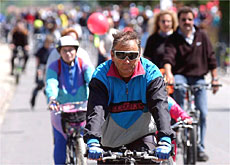Slowing down to see the sites

Around 50,000 people cycled, skated or rode scooters around Lake Murten on Sunday, kicking off Switzerland’s biggest ever season of car-free “SlowUp” festivals.
Thanks to the huge success of SlowUp since it began in 2000, five additional events are set to go ahead this summer in scenic locations across the country.
Tens of thousands of cyclists and skaters flowed non-stop along the roads hugging the shore of Lake Murten, passing through the walled medieval towns of Murten and Avenche and below the vineyards of Mont Vully.
One man covered the route on inline skates with his dog scampering alongside, while several skaters pushed their offspring through the moving masses in prams.
The bicycle builder Alex Moulton travelled all the way from Britain for Murten’s SlowUp (see video). The 84-year-old headed up a team of cyclists riding his one-of-a-kind, small-wheeled bikes, known for their speed and durability.
Pedalling public
But neither speed nor endurance is the essence of SlowUp. Participants were tempted to stop along the route by the region’s winemakers who opened their cellars for the event.
The tired and thirsty pedalling public also queued for fried fish and local sausage at the many roadside stalls, abandoning their bikes higgledy-piggledy under trees and against buildings.
Live bands entertained from portable stages.
“It’s not a sporting event, but a social event bringing people together to have fun,” says Jörg Stäuble, one of the SlowUp organisers.
Stäuble says the goal of the festival is to promote what organisers call “human powered mobility”. SlowUp, he says, should also benefit regional tourism and contribute to health and fitness.
Rhine and Gruyère
The next event takes place along the Rhine River in northern Switzerland before moving to the Jura hills in the west of country, where the setting will be the picturesque Vallée de Joux.
The roads around the important tourist village of Gruyère will be car-free on the second Sunday in July and the villages and towns on the Swiss side of Lake Constance will put on their version at the end of August.
Zurich has provisional plans to host its first event of the kind on September 26.
For each event, 25-40km of mostly flat roads are closed to motorised traffic.
The recipe has been such a hit that Stäuble predicts there will soon be eight to ten such events a year, each highlighting a different part of the country.
“Every SlowUp event must integrate regional traditions, food and music,” Stäuble explains.
“People taking part can taste the excellent wines around Lake Murten or cider if they go to Lake Constance, a part of the country known for its apple orchards.”
Ride and rail
The organisers work closely together with the Swiss Federal Railways to ensure that as many people as possible can not only travel by train, but transport their bikes to the events as well.
It is also possible to hire bikes at railway stations in participating SlowUp towns by booking in advance (see “related sites”). Well-maintained bikes of all kinds are available, including tandems, children’s models and trailers for pre-schoolers.
“He’s slept the whole way,” says one father laughing as he pushes his one-year-old along in a pram. “He’s missing all the excitement.”
swissinfo, Dale Bechtel in Murten
This year’s SlowUp events:
Lake Murten – May 23
Rhine River – June 6
Vallée de Joux – June 20
Gruyère – July 11
Lake Constance – August 29
Lake Zurich – September 26 (provisional)
The first SlowUp event took place around Lake Murten in 2000 as a way of promoting the bicycle and inline skating trails in the region ahead of Switzerland’s national exhibition in 2002.
It proved so popular that SlowUp has been held every year and a similar event took place for the first time on the shore of Lake Constance two years ago.
Four other locations and dates have been added this year.

In compliance with the JTI standards
More: SWI swissinfo.ch certified by the Journalism Trust Initiative









You can find an overview of ongoing debates with our journalists here . Please join us!
If you want to start a conversation about a topic raised in this article or want to report factual errors, email us at english@swissinfo.ch.